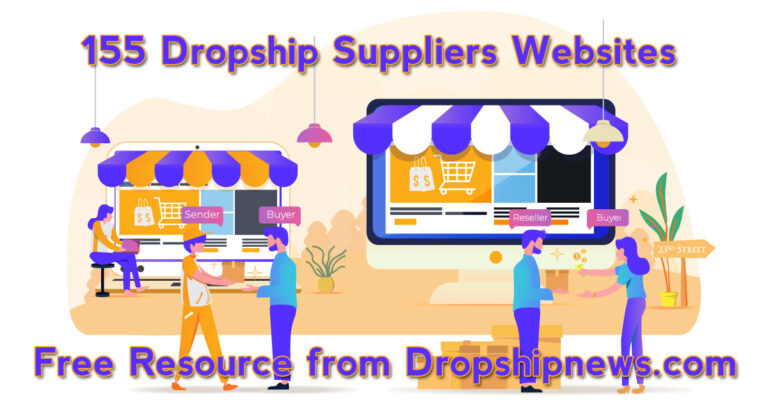Plant Dropshipping Business: 8 Essential Secrets for Blooming Online Growth

Is Dropshipping Plants Online a Business Opportunity: Can You Dropship Plants?
Plant dropshipping represents a specialized e-commerce business model where entrepreneurs sell live plants, seeds, and gardening products directly to consumers without maintaining physical inventory. This business model connects three key entities: the dropshipping retailer (who markets and sells), the wholesale plant supplier (who stocks and ships), and the end customer (who purchases and receives plants).
The operational relationship within plant dropshipping functions through this process: customers place orders on the retailer’s online store, the retailer forwards these orders to their plant supplier partners, and suppliers ship products directly to customers. This eliminates the retailer’s need for warehouse space, inventory investment, and shipping logistics while enabling access to diverse plant varieties from multiple wholesale sources.
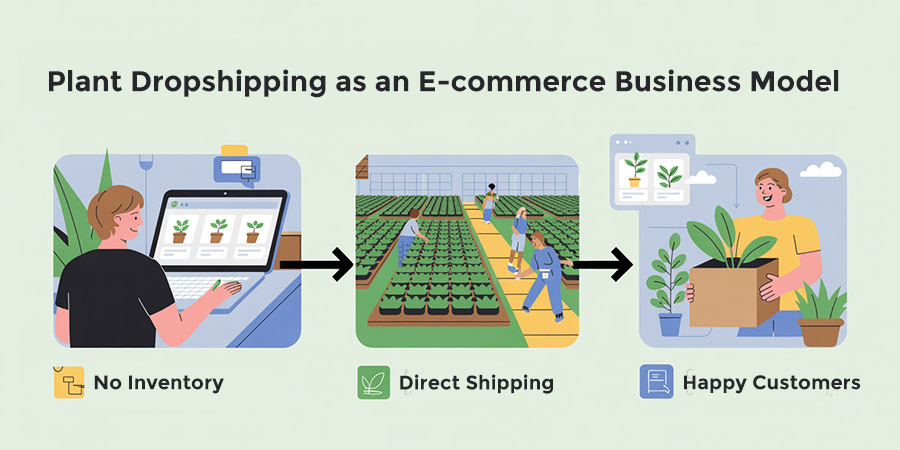
Market Demand Driving Plant Dropshipping Opportunities
The plant dropshipping market capitalizes on several interconnected consumer trends that create sustainable demand for online plant purchases. Indoor gardening popularity has surged as urbanization increases, with consumers seeking to incorporate natural elements into residential and office spaces.
Key market drivers supporting plant dropshipping include:
- Health and wellness consciousness: Consumers increasingly recognize that houseplants improve indoor air quality, reduce stress levels, and enhance mental well-being
- Social media influence: Platforms like Instagram and Pinterest showcase plant-decorated interiors, driving consumer desire for photogenic plant varieties
- Remote work trends: Home office setups create demand for low-maintenance plants that enhance productivity and workspace aesthetics
- Sustainability awareness: Eco-conscious consumers prefer businesses that promote sustainable sourcing and environmentally responsible practices

Optimal Plant Categories for Dropshipping Success
Low-Maintenance Plant Varieties for Beginner Markets
Successful plant dropshipping businesses prioritize hardy, low-maintenance plant species that survive shipping stress and thrive with minimal customer care. These plant categories form the foundation of profitable dropshipping operations:
- Succulent plants: Including aloe vera, echeveria, and jade plants, these species require minimal watering and tolerate shipping conditions exceptionally well
- Air-purifying houseplants: Snake plants, pothos, and spider plants appeal to health-conscious consumers while demonstrating resilience during transit
- Drought-tolerant varieties: Plants that survive irregular watering schedules reduce customer care complaints and return rates
Premium and Specialty Plant Segments
Advanced plant dropshipping businesses expand into specialty plant markets that command higher profit margins and attract dedicated customer segments:
- Rare and exotic houseplants: Monstera varieties, fiddle leaf figs, and uncommon species appeal to serious plant collectors
- Seasonal plant offerings: Holiday-specific plants like poinsettias create time-sensitive purchasing opportunities
- Plant care accessories: Complementary products including planters, fertilizers, and care tools increase average order values
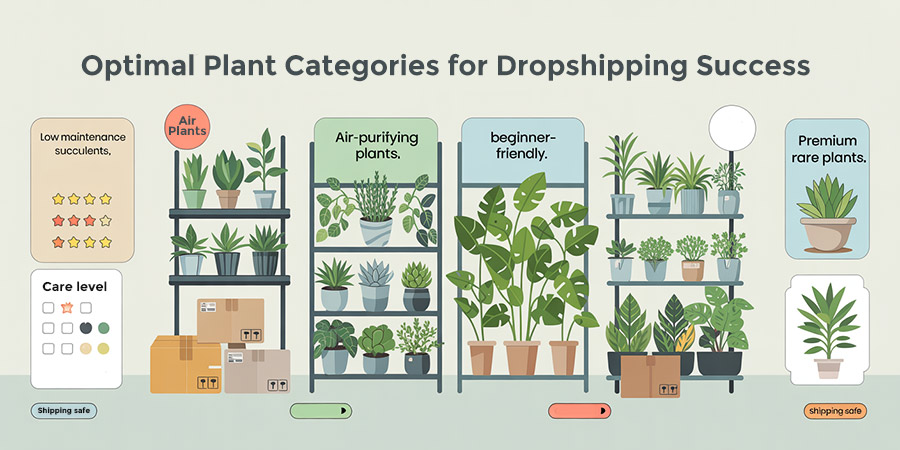
Building Your Plant Dropshipping Store on Shopify
Shopify Platform Advantages for Plant Retailers
Shopify e-commerce platform provides specialized tools that support plant dropshipping business requirements. The platform’s integration capabilities connect plant retailers with dropshipping automation apps, inventory management systems, and supplier networks efficiently.
Essential Shopify features for plant dropshipping include:
- Customizable plant-focused themes: Templates designed for botanical and gardening businesses enhance visual appeal
- Dropshipping app integrations: Tools that automate order processing between your store and plant suppliers
- SEO optimization tools: Built-in features that improve search engine visibility for plant-related keywords
- Mobile-responsive design: Ensures optimal shopping experience across devices, critical for plant enthusiasts browsing on mobile
Niche Selection Strategy for Plant Stores
Successful plant dropshipping specialization requires defining specific market segments rather than attempting to serve all plant customers. Focused niches enable targeted marketing, specialized supplier relationships, and expert positioning within plant communities.
Profitable plant dropshipping niches include:
- Indoor air-purifying plants: Targeting health-conscious urban consumers and office environments
- Low-light houseplants: Serving apartment dwellers and spaces with limited natural light
- Pet-safe plant varieties: Appealing to pet owners concerned about plant toxicity
- Beginner-friendly plant collections: Focusing on new plant parents seeking easy-care options
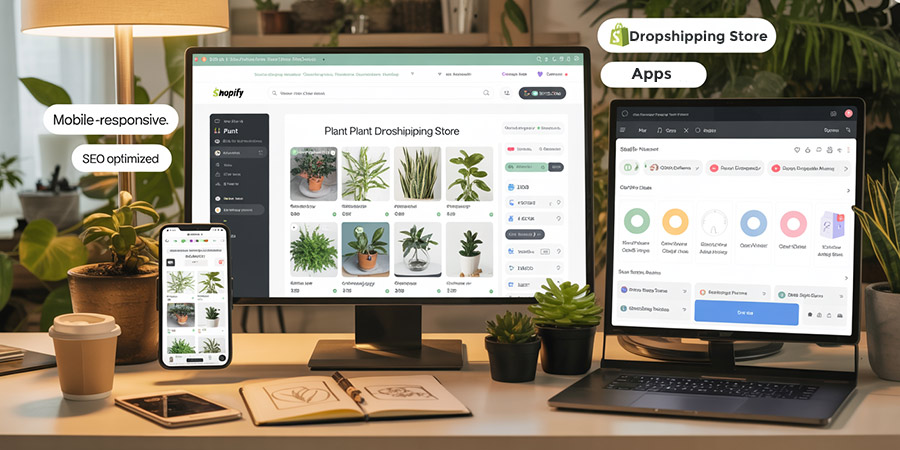
Sourcing Plant Dropshipping Suppliers
Wholesale Plant Supplier Evaluation Criteria
Plant supplier selection determines the success of dropshipping operations through direct impact on product quality, shipping reliability, and customer satisfaction. Effective supplier partnerships require comprehensive evaluation of multiple operational factors.
Critical supplier assessment factors include:
- Plant quality standards: Suppliers must maintain consistent plant health, proper packaging, and damage-free shipping protocols
- Geographic shipping coverage: Supplier locations and shipping zones must align with your target customer markets
- Inventory reliability: Suppliers should maintain adequate stock levels and provide accurate availability information
- Dropshipping integration: Technical capabilities for automated order processing and tracking information sharing
Regional Supplier Considerations
Geographic proximity between plant suppliers and customers significantly affects shipping costs, delivery times, and plant survival rates. Regional supplier networks enable faster delivery and reduced transportation stress on live plants.
Key regional supplier advantages:
- UK plant dropshipping suppliers: Serve European markets with faster delivery and reduced customs complications
- North American plant wholesalers: Provide extensive variety and established logistics networks for US and Canadian markets
- Local nursery partnerships: Enable same-day or next-day delivery in metropolitan areas
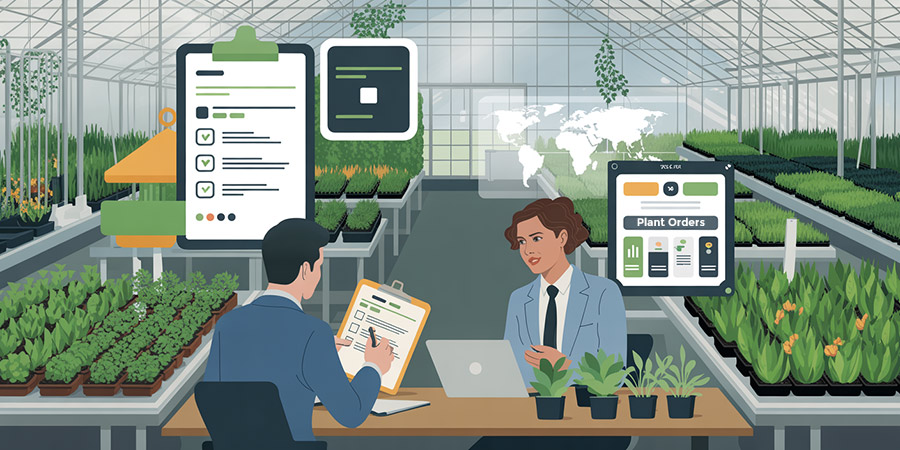
Marketing Strategies for Plant Dropshipping Businesses
Search Engine Optimization for Plant E-commerce
Plant-focused SEO strategy drives organic traffic by targeting specific search terms used by potential plant customers. Effective optimization connects plant care information, product descriptions, and educational content to capture customers throughout their plant-buying journey.
Essential SEO elements for plant stores:
- Plant care content: Comprehensive guides addressing common plant care questions establish authority and attract organic traffic
- Product-specific keywords: Optimizing for specific plant names, care levels, and customer needs
- Local SEO optimization: Targeting geographic markets for faster shipping and local plant communities
- Image optimization: High-quality plant photography with descriptive alt text improves search visibility
Social Media Marketing for Plant Communities
Plant community engagement through social media platforms creates loyal customer relationships and drives repeat purchases. Plant enthusiasts actively share experiences, seek advice, and discover new varieties through social platforms.
Effective social media strategies include:
- Instagram plant showcases: High-quality plant photography and care tips attract plant enthusiasts
- Plant care education: Sharing expert advice positions your brand as a trusted plant authority
- Customer plant success stories: User-generated content demonstrates product quality and care effectiveness
- Seasonal plant promotions: Timely campaigns for holiday plants and seasonal care needs
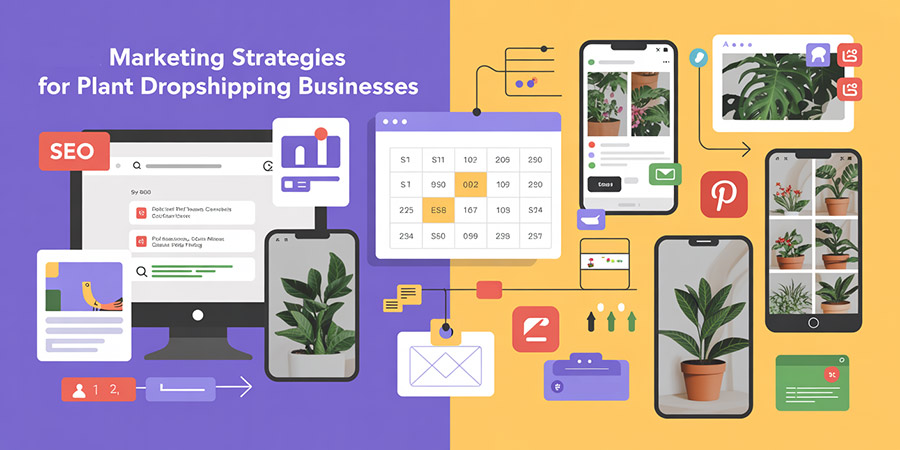
Operational Excellence in Plant Dropshipping
Quality Control and Customer Satisfaction
Plant quality assurance requires systematic processes to ensure customer satisfaction despite not handling products directly. Successful plant dropshippers establish quality standards with suppliers and implement customer feedback systems to maintain service excellence.
Quality control measures include:
- Supplier quality audits: Regular assessment of plant condition, packaging standards, and shipping practices
- Customer feedback monitoring: Systematic collection and analysis of plant condition reports and care success rates
- Return and replacement policies: Clear procedures for addressing plant damage or customer dissatisfaction
- Care instruction provision: Comprehensive plant care guides that improve customer success rates
Legal and Regulatory Compliance
Plant commerce regulations govern the legal sale and interstate shipping of live plants, requiring compliance with agricultural, import/export, and consumer protection laws. Plant dropshippers must ensure supplier compliance and understand market-specific restrictions.
Compliance considerations include:
- Phytosanitary regulations: Requirements for plant health certificates and pest-free shipping
- State shipping restrictions: Some plant species face interstate shipping limitations due to invasive species concerns
- Import/export documentation: International plant shipments require specific permits and certifications
- Consumer protection laws: Truth in advertising and product guarantee requirements for live plant sales
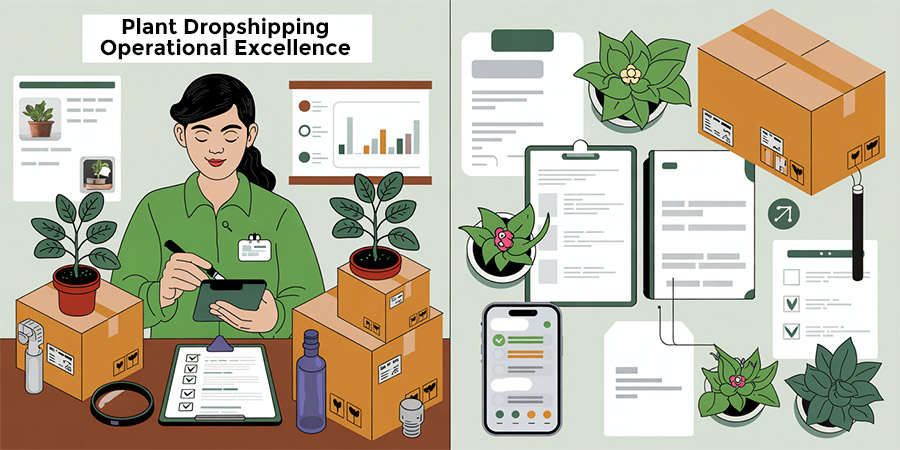
Scaling Your Plant Dropshipping Business
Diversification and Growth Strategies
Business expansion in plant dropshipping occurs through product diversification, market expansion, and operational optimization. Successful scaling requires maintaining quality standards while increasing sales volume and customer reach.
Growth strategies include:
- Product line expansion: Adding complementary products like planters, tools, and fertilizers increases average order values
- Geographic market expansion: Partnering with regional suppliers enables service to new customer markets
- Seasonal specialization: Developing expertise in holiday plants and seasonal gardening creates recurring revenue opportunities
- B2B market development: Serving office buildings, hotels, and commercial spaces provides larger order volumes
Technology Integration and Automation
Dropshipping automation reduces manual processing time and improves operational efficiency as plant businesses scale. Integration between e-commerce platforms, supplier systems, and customer service tools enables growth without proportional staff increases.
Automation opportunities include:
- Order processing automation: Direct integration between store orders and supplier fulfillment systems
- Inventory synchronization: Real-time updates of plant availability across multiple suppliers
- Customer communication automation: Automated care instructions, shipping updates, and follow-up sequences
- Performance tracking systems: Automated reporting on sales trends, supplier performance, and customer satisfaction metrics
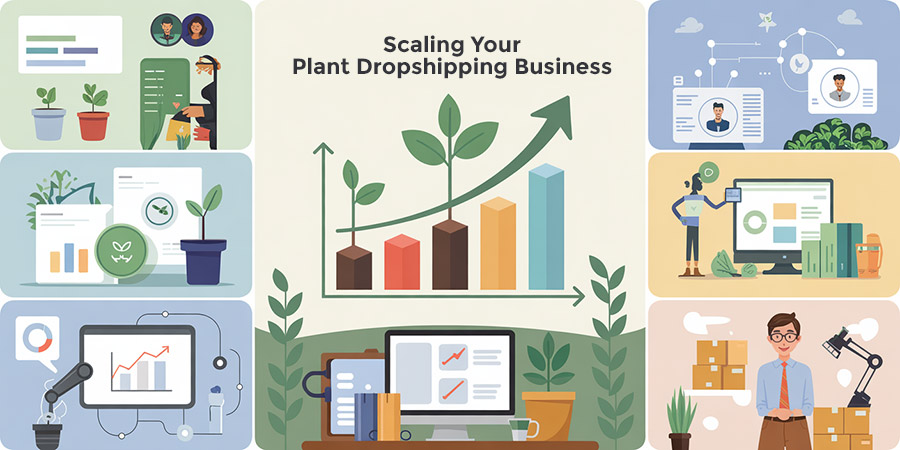
Success Factors for Long-term Plant Dropshipping Profitability
Sustainable success in plant dropshipping business requires balancing customer satisfaction, supplier relationships, and operational efficiency. The interconnected nature of these elements creates a business ecosystem where improvement in one area supports growth in others.
Long-term success depends on:
- Customer education and support: Providing comprehensive plant care resources that increase customer success rates and reduce returns
- Supplier partnership development: Building strong relationships with reliable plant suppliers who share quality and service commitments
- Market adaptation: Staying responsive to changing plant trends, seasonal demands, and customer preferences
- Operational continuous improvement: Regularly optimizing processes for efficiency, quality, and customer satisfaction
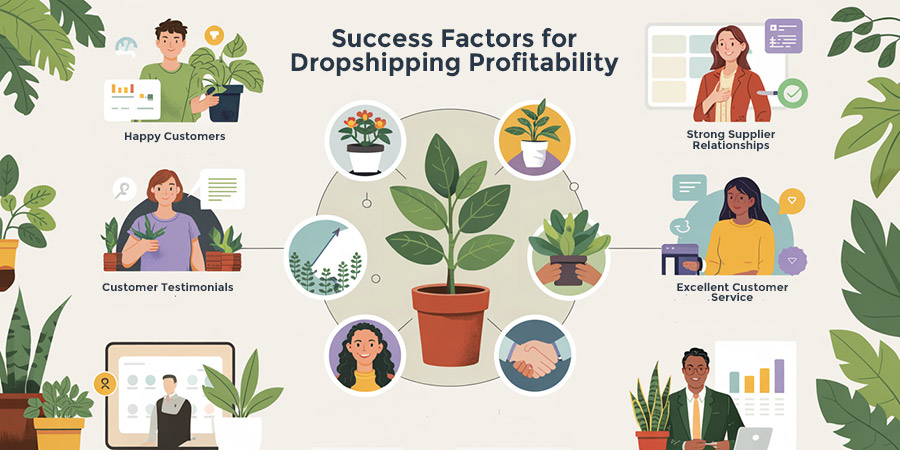
The plant dropshipping opportunity continues expanding as consumer interest in indoor gardening, sustainable living, and home beautification grows. Entrepreneurs who focus on quality products, excellent customer service, and reliable supplier relationships can build profitable businesses that serve the growing community of plant enthusiasts while contributing to healthier, more beautiful living spaces.

